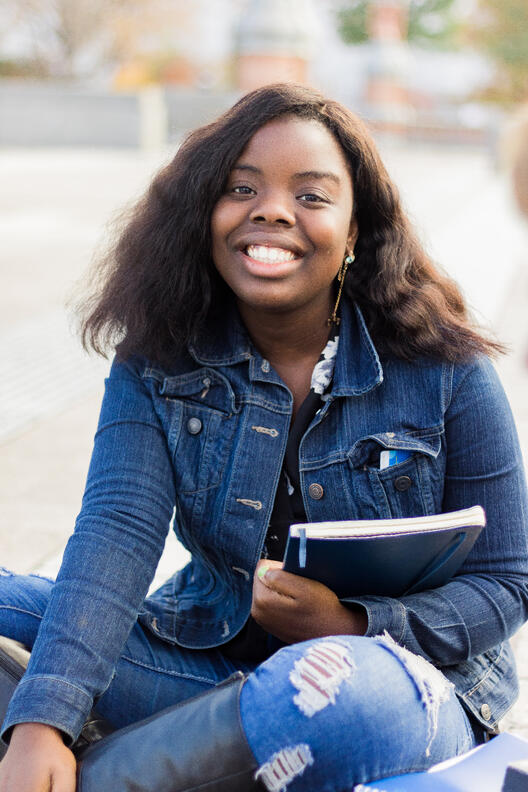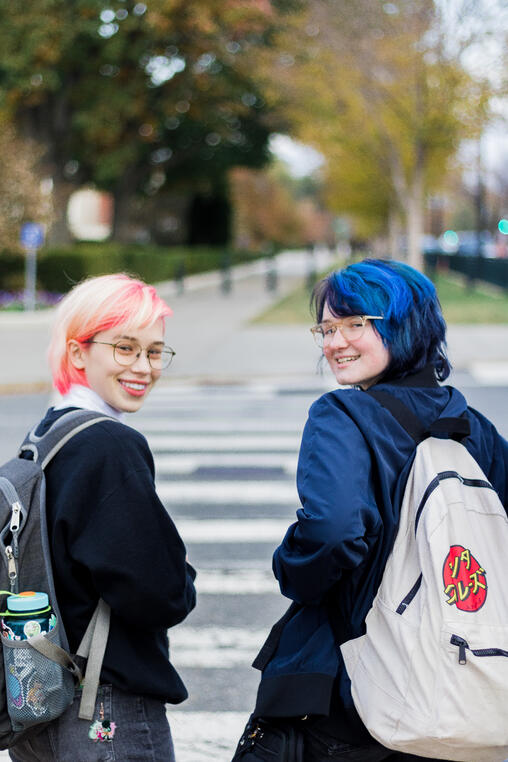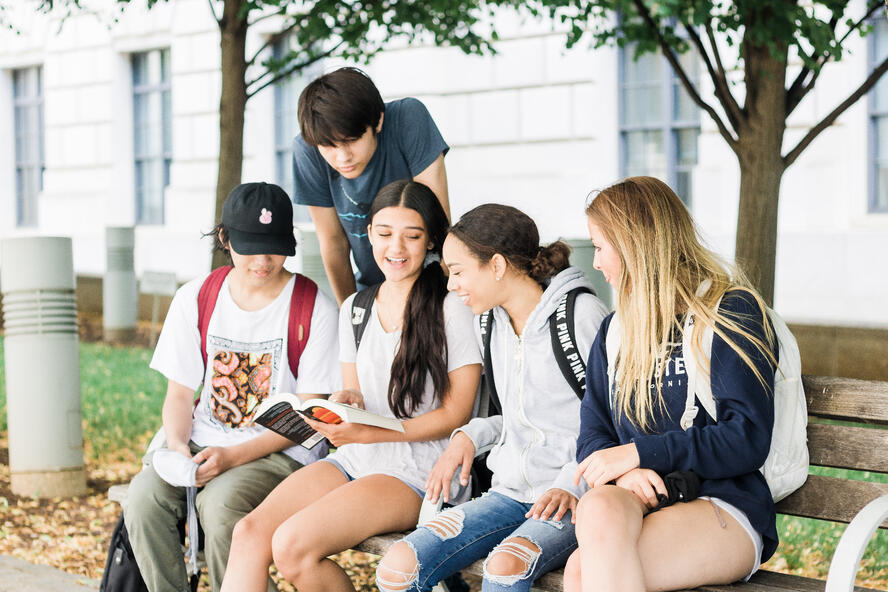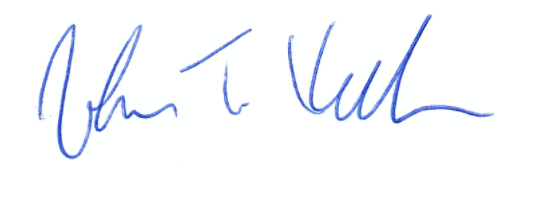At Templeton Academy, we believe wrestling with good questions is much more important than reciting correct answers, especially in a world where most young people have a computer in their pocket.
Thus, I will answer the title’s question with another question: What are your gifts and how can you use them in a way that brings you joy and serves others? I do so because when young people wrestle with this question they are already engaged in the very process that will lead them to flourish into lifelong learners.
In a word, this process leads them to purpose.

At Templeton Academy, we believe that there are three fundamental types of learning: learning to know, learning to do, and learning to be. Put another way, there is learning to know facts and figures, learning to do actual skills, and learning to become your best self.
And we believe that “learning to be” is the type of learning that actually matters most in the Age of Innovation. After all, though mental prowess is timeless, knowing/regurgitating the “correct” facts and figures in the “smart” phone age is arguably less important.
And as important as skill development is, in a world of 7.5 billion people, unless that particular skill is really blowing your hair back, chances are you might have a difficult time becoming your best self if you’re solely focused on developing your “best” skill.
But actually is “learning to be”? How do you do it? How can you measure it?
In short, to find your purpose. And because we agree with those that think not all middle and high school age learners can or will land on their life’s purpose during those years of their life, we push students to explore their potential purpose even if they do not land on a definitive answer.
Before I go any further, I want to be very clear to whom I’m speaking. Perhaps you’re a parent reading this. Perhaps you’re wondering (in every sense of the word) as to how your child might rediscover that innate love of learning they possessed from the get-go — much less how you can and should rethink your child(ren)’s schooling amidst the COVID-19 pandemic? Or perhaps you’re in middle or high school wondering more broadly as to how this “education” that you’ve been receiving in your school applies to you, much less applies to your world beyond school that you will be facing.
So from here on out, I will be talking to you, the Student (capitalization very intentional). And to the elder lifelong learners who have passed the ultimate intelligence test and consider themselves lifelong Students, I please keep reading and share with the young learners in your life who might be looking to bring purpose back to their learning.
The Need for a New Educational Paradigm
Here’s the reality for you younger learners: the longer we “educate” you, the less motivated you become. The most recent Gallup Student Poll reports 74 percent of 5th graders felt engaged in school, whereas only 32 percent of high school juniors do. Sadder still, what Gallup has dubbed the “school engagement cliff” appears to be growing.

Many schools today closely resemble the factory schools of yesteryear (or yestercentury for that matter) — the industrial model built in and for the industrialized age. The focus for so many of these not-so-modern modern-day schools (maybe yours?) and their testing is on learning to know facts and figures in the smartphone age where Students have so much knowledge literally at their fingertips. Many inquiry and project-based elementary models transition in middle and high school to lectures with well-intentioned sages on stages at the front of the class espousing answers needed for the next test. As a result, and per the Gallup data, many of you are understandably becoming bored, and as a result, disengaged.
In short, you’re losing your innate love of learning as it is — quite ironically and tragically — educated out of you.
Private schools have long been seen for many as desirable educational options, offering smaller classes, engaged students, and a myriad of resources. But long-term trends that look at private school enrollment and household income show that private school has increasingly become an option only for higher income families. A study, conducted by researchers at the Harvard Kennedy School, found that, between 1950 and 2015, “the share of middle-income students attending private schools has declined by almost half, while the private-school enrollment rate of wealthy children has remained steady.” The decline stems, in part, from the closing of Catholic schools, which once offered more affordable options for parents, from all backgrounds, looking for an alternative to their public schools.
Furthermore, if your family can afford rapidly escalating tuition at most private schools, your parents are demanding additional “concierge” educational services to justify the exorbitant expense. Yet, this should be causing you to think twice, considering that in this age of increasingly rapid change, the future likely belongs to those who can become self-directed, lifelong learners — those who can think for themselves and see challenges as opportunities rather than obstacles. In turn — and for the parents still reading — perhaps the return on investment of the increasingly expensive concierge private school is diminishing even faster than the tuition is increasing?
The Transformative Solution Templeton Academy Provides
Templeton Academy is here for you — you the Student who is questioning what your schooling should look like in the 21st century. More specifically, we’re here for 21st century Students. Even more specifically, we’re here for you and your family.
You shine with possibility. And you ache with hope that your possibility becomes reality. Like many Students, you have plateaued in your school. So much memorization. So much emphasis on standardized tests. So many “how will I use this in life?” questions. “Is this all there is when it comes to my education?” Maybe you have family or friends in private school, but like most young people, perhaps that’s an option beyond your family’s reach. And sure, there are materials on the Internet you and your parents can click through to brush up on the same stuff you’re taught in the classroom, just like every classroom, in nearly every school, for Students your age.
But what if you had access to an educational experience that would reignite your passion to learn — like when you were 3 or 4 or 5? What if you had teachers with real-life experience who could inspire and energize you? What if you had lesson plans that were so individualized, they had your name written all over them? What if you were encouraged to take stock of what you found meaningful in life, develop the talents you possess to pursue that path, and were given the tools to make it all a reality?
That’s where we come in.
How Templeton Academy Students Flourish Into Lifelong Learners:

At Templeton Academy, our North Star is to help students find their guiding North Star. The first characteristic we hope for in Templeton graduates — and teach for and guide for accordingly — is that they will understand their gifts and how they might use them in a way that brings them joy and serves others.
As for how we teach that, we begin with the question above:
What are your gifts and how might you use them in a way that brings you joy and serves others?
There is no “correct” answer to regurgitate. Like most good questions, the learning really happens in wrestling with it.
From there, we offer two additional questions to move learners onward and upward:
What skills will you develop/master (to explore your potential purpose)?
What knowledge do you need and how will you obtain it ?
As for how we can measure the growth that takes place in this process, we again simply ask the final two questions of the learner:
How will you prove what you know and what you can do?
Who will affirm you and hold you accountable?
In short, develop a hypothesis around your purpose, then develop the skills and obtain the knowledge that you need to test that hypothesis and determine whether or not that is in fact your purpose. Share with others on a regular basis what you’ve done and what you’ve learned — those whom you trust (adults and peers alike) to be equally honest when you deserve gracious affirmation or gravity-inducing accountability. And then double down on your purpose or search for a new one knowing what you know now.
Support Points: The Specifics of Our Educational Model
| PURPOSE-DRIVEN | ||
|---|---|---|
| Deeper Learning – Structured Agency – Block Schedule with FLEX – Gold Standard Project-based Learning | Core Advisory – Core Foundations – Peer Advisor – Learning Coach – Community Exhibitions | City as a Classroom – Experiential Learning- Interdisciplinary Studies – Community Service Projects |
| LIFELONG LEARNER |
Purpose-Driven Learning: Each student at Templeton is on their own educational journey. We believe that the best fuel for that journey is wrestling with good questions rather than reciting the correct answer. Further, we believe in not only learning to know, but also learning to do, and most importantly, learning to be. And that learning to be is a process of finding your purpose. Three pillars of our model bring this purpose-driven learning to life.
Deeper Learning: Our Academic model is built around Student agency, defined as giving Students voice and choice in how they learn. And our goal is structured agency — a learning community that is both Student and teacher designed and led. Academic blocks of two hours over a 10-week term provides substantial time for rich, Socratic discussions, independent and community projects. We use the academically rigorous model of Gold Standard Project-Based Learning that focuses on authenticity and real-world connections, contains rigorous reflection and revision, and whose efficacy in increasing higher-level thinking skills and key success skills is well-documented.
- Core Advisory: The Templeton Core Foundations curriculum is focused on learning how to learn. Students come to understand that their job is putting in the work to educate themselves, whereas a teacher’s job is to be a guide on the side rather than a sage on a stage. Students work to master critical skills such as resourcefulness, conscientiousness, creativity, curiosity, resilience, persistence, stress management and time management. They set SMART goals, are supported and held accountable with Peer Advisors and more senior Learning Coaches, developing active listening, collaboration, compassion and empathy — ultimately developing mastery in these areas and becoming Peer Advisors and Learning Coaches themselves. Ultimately, all work is shared with the school community and larger community at quarterly, Community Exhibitions, fueling constant reflection, assessment, action and growth.
- City as Classroom: Templeton Academy prioritizes learning from authentic experiences and interacting with the world around us. Thus, we use our longer learning blocks to learn by doing — leveraging the resources of the city from museums, to libraries, to gyms and green spaces. In addition, the focus is on giving back to the city, as projects for courses are deeply intertwined with the community and its needs. Going beyond typical community service, students work with community-based organizations helping devise solutions to their current challenges.
Outcomes
All Templeton Academy Graduates will:
- Understand their gifts and how they can use them in a way that brings them joy and serves others;
- Think creatively and solve problems by seeing challenges as opportunities, not as obstacles;
- Communicate effectively as global citizens who are engaged and empathetic members of their local communities;
- Become a purpose-driven lifelong learner prepared to thrive in college, career and life.
The Call to Action
The COVID-19 pandemic has upended many school models, but in many ways, Templeton Academy was built for this moment. In a world where so many school models are more focused than ever on learning to know — now delivered via “distance learning” which may likely be more accurately described as “emergency remote education.” Where sprawling campuses with 20-30 learners per classroom are struggling to rethink their facilities…

Templeton Academy has an average class size of 10. We have a minimal facilities footprint that utilizes the city as our classroom and provides ample social distancing. We’re the affordable independent school that puts students first. And we do so by putting each individual Student’s purpose first.
In short, Templeton Academy offers learning with purpose.
But as I hope is now clear, Templeton Academy was not only built for this moment, but for what schooling could and should look like in the 21st century.
Thus, more importantly, this is your moment.
So what is your purpose? What are your gifts and how can you use them in a way that brings you joy and serves others?
Needless to say, we look forward to your response!
Thanks in advance for sharing, and my very best to you and yours,
Temp Keller

Co-Founder and President

